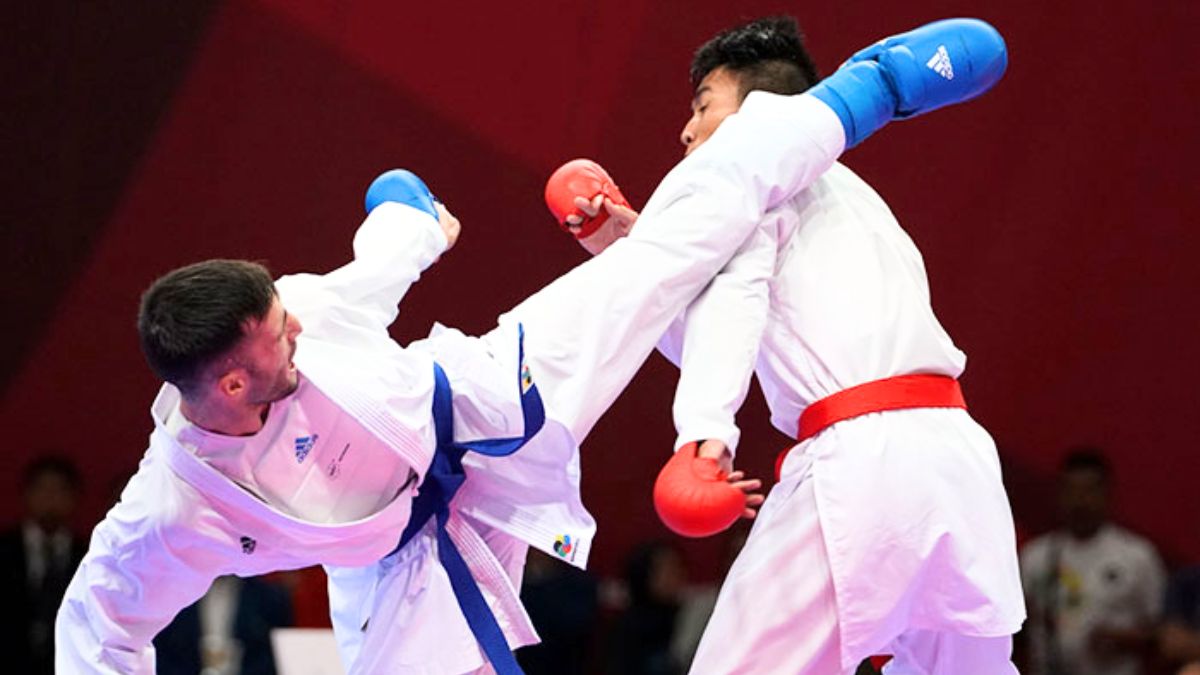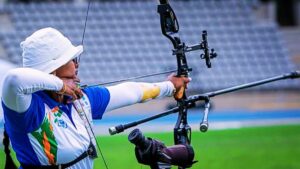Karate is a sport featured in the Asian Games, debuting in the 1994 edition of the Asian Games in Hiroshima, Japan. Karate is a form of martial art that originated in the Ryukyu Kingdom. Its evolution can be traced back to the native Ryukyuan martial arts referred to as “te,” which translates to “hand,” it was significantly influenced by Chinese martial arts, particularly Fujian White Crane.
Also Read: History of Ju-Jitsu at Asian Games
In the present day, Karate primarily involves striking techniques, including punches, kicks, knee strikes, elbow strikes, and various open-hand moves like knife-hands, spear-hands, and palm-heel strikes.
While the emphasis is on striking, certain historical practices and some modern variations of Karate also incorporate teachings on grappling, throws, joint locks, restraints, and strikes targeting vital points.
Asian Games Karate Editions and Top Nation
In the history of the Asian Games, Karate has marked its presence across various editions. Here’s a glance at the years, host cities, and the best-performing nation for each of these tournaments:
12th Edition – 1994, Hiroshima, Japan
The 1994 Asian Games in Hiroshima, Japan, witnessed the introduction of Karate as an event. The host nation, Japan, made an impressive start to its journey in the sport.
13th Edition – 1998, Bangkok, Thailand
Karate continued to be a part of the Asian Games in the 1998 edition held in Bangkok, Thailand. Japan showcased its dominance once again during this event.
14th Edition – 2002, Busan, South Korea
South Korea’s city of Busan welcomed the 2002 Asian Games, featuring Karate as a prominent sport. Japan maintained its strong foothold in Karate, emerging as the leading nation.
15th Edition – 2006, Doha, Qatar
The vibrant city of Doha, Qatar, hosted the 2006 Asian Games, keeping Karate an essential part of the sports program. Japan’s Karate athletes continued to shine on the international stage.
16th Edition – 2010, Guangzhou, China
Karate again took center stage. Japan’s exceptional performance in Karate earned them significant recognition.
17th Edition – 2014, Incheon, South Korea
South Korea’s Incheon was the host city for the 2014 Asian Games, where Karate competitors from across the Asian continent gathered to demonstrate their skills. Japan remained at the forefront of Karate excellence.
18th Edition – 2018, Jakarta–Palembang, Indonesia
The 2018 Asian Games, jointly hosted by Jakarta and Palembang in Indonesia, provided another platform for Karate athletes to shine. Japan’s consistent achievements in Karate are highlighted once more.
Throughout these editions, Japan has consistently displayed its power in Karate, establishing itself as a dominant force on the Asian Games stage.
Leading Medalist Countries in Asian Games Karate History
Regarding the sport of Karate in the Asian Games, certain nations have consistently demonstrated exceptional power and secured their positions at the top. Here’s a look at the top five countries that have earned the most medals in Karate throughout the history of the Asian Games.
1. Japan
Japan takes the leading position with an impressive medal count. They have claimed a remarkable 30 gold, 10 silver, and nine bronze medals, accumulating 49 medals.
2. Iran
Iran is second with 14 gold, 11 silver, and 10 bronze medals, making their total medal count 35.
3. Malaysia
Securing the third spot, Malaysia has garnered eight gold, seven silver, and 16 bronze medals, tallying up to a total of 31 medals.
4. Kuwait
Kuwait occupies the fourth position by achieving seven gold, six silver, and seven bronze medals, summing up to a total of 20 medals.
5. Kazakhstan
Kazakhstan rounds off the top five with six gold, six silver, and six bronze medals, accumulating a total of 18 medals.
These five nations have consistently excelled in Karate at the Asian Games, demonstrating their power, skill, and determination on the international stage.





